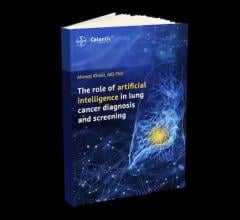
August 7, 2018 — Metro Health-University of Michigan Health announced it is partnering with healthcare data company Eon to improve the management of lung cancer screening and pulmonary incidental nodule patients with EonDirect. EonDirect is the first cloud-based software powered by deep learning and machine automation to seamlessly interface with hospitals' electronic medical records (EMR) and picture archiving and communication systems (PACS) to deliver meaningful, actionable data to healthcare providers.
Historically, Metro Health's pulmonary department — primarily the nurse navigator — tracked lung cancer screening patients with manually-entered data in a spreadsheet. They then used keyword recognition to flag patients with potential abnormal findings. However, this method yielded many false positives and required staff to examine each record to determine if the patient needed follow-up.
Metro Health sought to partner with Eon after seeing the company's approach to data analytics in lung cancer screening and incidental nodule management.
"We saw a volume increase in our lung cancer screening program as our education outreach efforts in the community ramped up, but managing the program manually was not sustainable or effective," said Peter Hahn, M.D., chief medical officer at Metro Health. "By implementing EonDirect, we will be able to grow our lung cancer screening and incidental pulmonary nodule programs, with high expectations that both will result in earlier detection of lung cancer, when it is more likely to be curable."
EonDirect, Eon's flagship software platform, seamlessly navigates patient data through the entire care continuum from intake to diagnosis. It leverages artificial intelligence (AI) and machine automation to identify abnormal findings, stratify patients into different risk categories, auto-populate registry data and automate routine tasks such as letter batching, among other tasks. The result is more timely and accurate cancer diagnosis, improved clinical workflow and reduction in staff time on data entry tasks. EonDirect's Lung Expert application is proven to have 98 percent accuracy in diagnosing lung nodules. That accuracy translates into abnormalities identified faster and without the possibility of human error, so treatment can begin sooner.
"Similar to mammography and the early years of breast screening, lung cancer screening is still in its infancy," said Srinivas Mummadi, M.D., pulmonologist and informaticist at Metro Health. "We know early detection of any cancer saves lives, and EonDirect's ability to automatically identify and register lung cancer screening and pulmonary incidental patients will allow Metro Health to follow these patients more effectively and ensure they receive the proper follow-up. Data shows incidental patients only receive the recommended follow-up 30 percent of the time. Could you imagine if we only followed 30 percent of women with a breast lump?"
For more information: www.eonhealth.com


 September 12, 2024
September 12, 2024 







